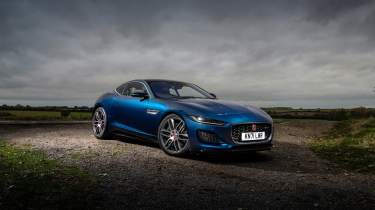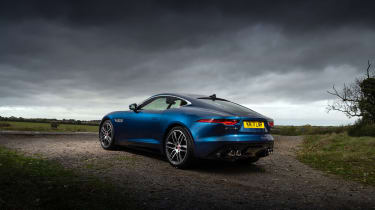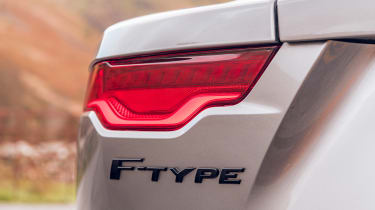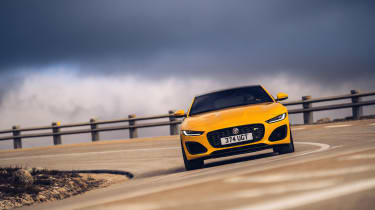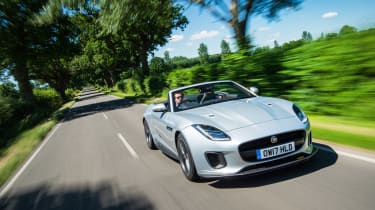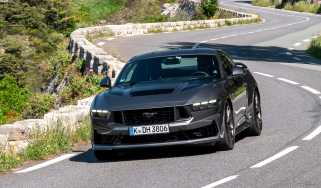Jaguar F-Type (2020 - 2024) facelift review – flying the flag for the great British sports car
The updated Jaguar F-Type appeals on style and image, but there’s no escaping its age against razor-sharp rivals
The F-Type was heralded as the return of the classic Jaguar sports car when it first hit the road in 2013. Smaller than the XK coupe that it effectively replaced, it was Jaguar’s attempt at producing a world-beating sports car for the first time since the E-type was first revealed in Geneva in 1961.
Seven years later the F-Type has been given a major overhaul with fresh styling, a realigned engine range and improved tech. The biggest change to the range is the loss of the old car’s supercharged V6 engine, instead the new F-Type is available in a single four-cylinder turbocharged petrol variant or with a choice of two supercharged V8s. The previous range-topping SVR model is also dead, but the standard F-Type R has picked up its full-strength 567bhp V8 to compensate.
> Jaguar F-type (2013 - 2019) pre-facelift review
What hasn’t changed is the F-Type’s distinctive style. Despite the quite substantially different front end, the Jag’s dramatic proportions and sleek lines have remained true to the original, which even now makes it one of the most distinctive sports cars on sale.
So with a realigned range and some key updates, does the F-Type maintain its appeal, or have the changes been too little, too late to compete against its talented and widespread range of rivals?
Jaguar F-Type: in detail
- Engine, gearbox and technical highlights > Both V8 and four-cylinder options are connected to an eight-speed auto, but only the V8 feels right for the package
- Performance and 0-60 time > All F-Types make good progress, but for 911-levels of performance, you’ll need the top-tier 567bhp R
- Ride and handling > An inherently well balanced and playful chassis is in there, but different models have different issues
- MPG and running costs > Don’t kid yourself that the four-cylinder will crack big MPG, and the V8s, well, they drink like a cricketer on leave
- Interior and tech > Isn’t nearly as dated as its age would suggest. It’s snug, intimate and well built inside; tech is improved, but still not class-leading
- Design > Some will love the new look, others won’t. It is executed well though, and still distinctly ‘Jag’ on the road
Prices, specs and rivals
The F-Type has historically slipped between key German rivals in terms of price and thanks to the spread of engine options, but with that comes an extreme price variation between models. Kicking off the range is the P300 Coupe which starts at just over £54,000, putting it right in the middle of the heavily populated sports car class.
More reviews
One could consider everything from the Alpine A110, Porsche 718 Cayman S, Toyota Supra, Ford Mustang GT or even a Mercedes-AMG CLA45 S as a potential rival to the F-Type. The 300bhp figure is on the lower end compared to many in this class, but given the heights the F-Type range extends to, it is a lot of sports car for the money.
Next up is the P450 at over £70,000, which not only includes the V8 powertrain but opens up the option of all-wheel drive for a further £5k. The chassis layout is largely the same between the different variants, but the V8s do feature bigger wheels, tyres and brakes as standard. At this £70k price point, it slots in around £10k less than a base 992-gen Porsche 911 Carrera or the Lexus LC500, and is closer in price to saloon-based sports coupes like the Audi RS5, Mercedes-AMG C63 S and BMW M4.
The top-tier all-wheel drive only F-Type R tips in at around the £97,000 mark, but while it’s getting on for double the price of the four-cylinder it has the horsepower to back it up. In terms of rivals, a well-specced Porsche 911 Carrera 4S can easily reach six figures and while it still has the edge in outright acceleration, it’s substantially down on power and torque. At near £100k, it’s also impossible to overlook rivals like the Aston Martin Vantage, Audi R8 RWD, Mercedes-AMG GT and their ilk; they might be £10-20k more expensive, but could be considered more serious performance cars than the Jag.
All powertrain variants are also available in Roadster form with a rough £5k price rise (each varies slightly), while R models are also available with carbon ceramic brakes for an additional £6k.
Used and nearly new Jaguar F-Type models
Despite the age of the F-Type’s design it still cuts the mustard today and has a stylish yet muscular look that’s pretty alluring. Perhaps less well built than its German rivals, but there’s a huge choice of engines and trim levels, with the 2-litre diesel being the most sensible used choice. However, the V6s are a more enticing purchase, offering the best blend of performance and running costs while also being the only model offered with a manual gearbox. The V8s are genuinely rapid. The good news is that there are plenty of models to choose from on the used market and hefty initial depreciation means that prices are more than tempting.
Jaguar F-Type model history
The Jaguar F-Type made its debut in 2013 and was initially available with a brace of V6 engines with differing outputs – Coupe and S – while the sole V8 in the line-up was the R. To start with, all models used an automatic transmission and rear-wheel drive, but in 2015 the V6 models could be ordered with a manual ’box, while all-wheel drive was also introduced. The range-topping supercharged SVR was introduced in 2016, while the four-cylinder models joined the range in 2017. The range was freshened up in 2020 with a restyled exterior, updates to the interior and the dropping of the V6-engined examples.
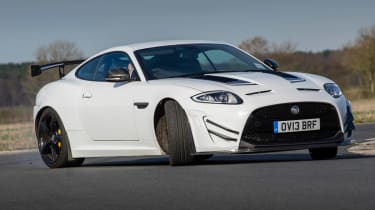
Used Jaguar XK (XK/XKR, 2006-2014)
Strictly speaking, the XK and XKR models were much more GT orientated than the more overtly sporting F-Type, and both the coupe and convertible offered 2+2 accommodation rather than the F-Type’s strict two-seater set-up. Designed by Ian Callum it’s certainly an attractive machine, with shades of the E-type about it, and it still looks pleasing on the eye. Initially it featured a 4.2-litre V8 but from 2009 a 5-litre V8 was offered which upped both power and performance. Dynamically it wasn’t as sharp as its contemporaries but was great at covering long distances and with low prices it’s still an enticing prospect.
Older Jaguar models
Perhaps the F-Type’s closest relation is the original E-type launched over 60 years ago. Produced from 1961 to 1973 it was available in three distinct series, with the Series 1 cars being both the most overtly sporting and the most desirable today. Powered by 3.8 and 4.2-litre versions of the iconic XK engine as well as the V12 for the Series 3 cars, it was a very quick car when launched, with a quoted top speed of 150mph and a sub-seven second 0-62mph time.

